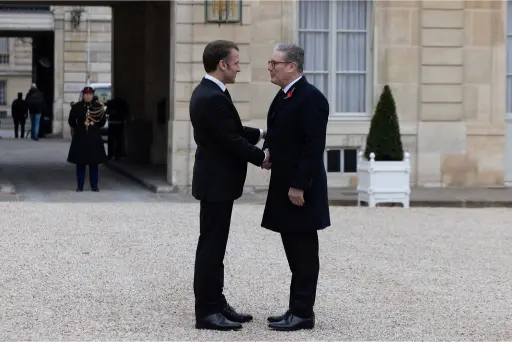In an effort to reinforce transatlantic unity amid an enduring conflict, the leaders of France and Britain have embarked on high-stakes trips to Washington, seeking to dissuade President Donald Trump from distancing the United States from Ukraine.
Trump’s direct talks with Russia on Ukraine have sparked concerns among European nations.
Both French President Emmanuel Macron and British Prime Minister Keir Starmer are motivated by a deep conviction that Ukraine is not only fighting for its own survival but is also at the forefront of a broader ideological and security struggle that has far-reaching consequences for Europe and the world.
The two leaders’ visits come at a time when the conflict, now in its third year, remains a flashpoint in global politics. Macron, known for his assertive diplomacy, has been particularly vocal in criticizing Trump’s recent remarks, which at times appear to echo narratives sympathetic to Russia. In his view, any perception of weakness in Washington could embolden President Putin, undermining the delicate balance of power in the region. Macron’s stern message underscores the idea that American strength and resolve are essential if Russia’s aggressive ambitions are to be checked.
On the other side of the Atlantic, British Prime Minister Keir Starmer has chosen a more measured approach. Eschewing direct confrontation, he has positioned himself as a bridge between Europe and the United States. Starmer’s careful rhetoric is designed to reinforce the message that the United Kingdom and its European allies share a vested interest in ensuring that Ukraine remains an active and decisive partner in any negotiations. He insists that Ukraine’s sovereignty and its right to determine its own future must remain the cornerstone of any peace settlement—a stance that serves both to honor Ukraine’s struggle and to maintain a united front against Russian aggression.
Both leaders are acutely aware that a withdrawal or reduction in American support could have serious implications. Beyond the immediate impact on Ukraine, they argue that such a move might signal a broader retreat from the collective defense and shared responsibilities that have long underpinned transatlantic relations. There is a growing concern that any faltering on the part of the United States could lead to a destabilizing shift in European security dynamics, potentially emboldening adversaries and fracturing the unity that has been pivotal in countering regional threats.
Underlying this diplomatic push is a broader strategy that involves a proposal for Europe to take on a greater role in its own defense. The idea is to create a “reassurance force” that could work in tandem with American capabilities—particularly through the provision of air power—to deter any further Russian military moves. Both Macron and Starmer stress that while Europe must increase its defense spending and capabilities, American involvement remains indispensable. The message they send is clear: a robust and enduring U.S. presence is essential not only for deterring immediate threats but also for preserving the international rules-based order that has long been a cornerstone of global peace and stability.
This concerted effort to secure U.S. backing is as much about protecting Ukraine as it is about safeguarding the future of Europe. The leaders of France and Britain are convinced that American support, when combined with a united European approach, forms the bedrock of a security framework that has kept regional tensions in check for decades. Their diplomatic mission in Washington is thus a critical reminder that the stakes of this conflict extend far beyond the borders of Ukraine, touching upon the fundamental principles of sovereignty, democratic governance, and collective security that the modern world depends on.
In the end, the drive to maintain U.S. engagement in Ukraine reflects a shared understanding that the conflict is not an isolated dispute but a litmus test for the resilience of international alliances. Macron and Starmer’s joint effort is aimed at ensuring that the United States remains a reliable partner—a commitment that, they argue, is indispensable for deterring aggression and preserving a stable, secure future for all of Europe.
